.svg.png)
I didn't ever think about Australia much. To me Australia had never been very interesting, it was just something that happened in the background. ~ Bill Bryson
Australia, officially the Commonwealth of Australia, is a country in the southern hemisphere comprising the mainland of the world's smallest continent, the island of Tasmania and a number of other islands in the Indian, Southern and Pacific Oceans. Australia claims approximately two-fifths of Antarctica, but this is not widely recognized. It is a member of the Commonwealth of Nations and its head of state is the monarch, Queen Elizabeth II.
Quotes
A
- The Australian government never comments on specific intelligence matters. I will never say or do anything that might damage the strong relationship and the close co-operation that we have with Indonesia, which is all in all, our most important relationship.
- Tony Abbott, as quoted on BBC News, "Australia 'spied on Indonesia President Yudhoyono'" (18 November 2013), BBC News, United Kingdom: British Broadcasting Corporation
- Australia has its share of xenophobic politicians... Australia has had some bad governments.
- Waleed Aly, "Voting Should Be Mandatory" (19 January 2017), The New York Times
B
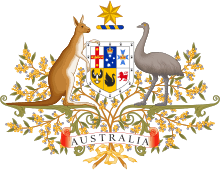
A country lying in the South Sea, whose industrial and commercial development has been unspeakably retarded by an unfortunate dispute among geographers as to whether it is a continent or an island. ~ Ambrose Bierce

Australia has moved from the extreme of wanting a white Australia to the extreme of saying that we will have an Asian Australia. ~ Geoffrey Blainey
- AUSTRALIA, n. A country lying in the South Sea, whose industrial and commercial development has been unspeakably retarded by an unfortunate dispute among geographers as to whether it is a continent or an island.
- Ambrose Bierce, The Devil's Dictionary (1911)
- Australia's distance from Europe was probably only tolerable because it had strategic commodities which England, threatened by changing European alliances, might some day be unable to produce in the northern hemisphere. Flax was the first conqueror - a hollow conqueror - of the distance which so often shaped Australia's destiny... Australia's place on new trade routes was decisive in its early history. It aided the convict settlement. It prompted the rise of a new free group of Australian traders who did not depend heavily on the favours of governors, who were alert for new ways of making money, and who were eventually to hasten Australia's transition from a goal to a series of free colonies.
- The convict system in essence was a form of compulsory, assisted migration. It eased the problems created by Australia's distance from Britain. Without it relatively few people from the British Isles would have made the costly journey across the world in Australia's first half century... The value of subsidised migration was not simply in the working men it brought to Australia. Its value was also in the women it enticed to a man's land. One of Australia's sharpest social problems, and one of the problems which Edward Gibbon Wakefield lamented, was the scarcity of women of marriageable or elopable age. So long as Australia primarily served as a gaol for the British Isles, far more men than women came to the land.
- Australia and New Zealand depended so much on Britain, were in most senses imitations of Britain, that their geographical position near the end of Asia's tail and near the islands of Oceania seemed irrelevant... In December 1941, when Australians began to sense that they were plunged into a new environment, the spectacles they had carried out from Britain were obsolete. They needed spectacles that would correct short-sightedness. They had to see the environment they were in as clearly as the environment they had left across the world.
- The convict era gave Australia a high English and Irish population and a predominance of men, a tendency to disdain authority and resent policemen, and probably a love of leisure and an indifference to religion. The convict era imposed on governments from the outset a high and detailed role in economic and social life. Some of these convict influences were fragile and were quickly erased or reversed by the waves of free immigration; some were reinforced by later events, so that they persist to this day.
- Geoffrey Blainey, A Land Half Won (1980)
- We are surrendering much of our own independence to a phantom opinion that floats vaguely in the air and rarely exists on this earth. We should think very carefully about the perils of converting Australia into a giant multicultural laboratory for the assumed benefit of the peoples of the world.
- Geoffrey Blainey, All For Australia (1984)
- I do not accept the view, widely held in the Federal Cabinet, that some kind of slow Asian takeover of Australia is inevitable. I do not believe that we are powerless. I do believe that we can with good will and good sense control our destiny.... As a people, we seem to move from extreme to extreme. In the past 30 years the government of Australia has moved from the extreme of wanting a white Australia to the extreme of saying that we will have an Asian Australia and that the quicker we move towards it the better.
- Geoffrey Blainey, Eye on Australia: Speeches and Essays of Geoffrey Blainey (1991)
- Anyone who tries to range over the last 200 years of Australia's history, surveying the successes and failures, and trying to understand the obstacles that stood in the way, cannot easily accept the gloomier summaries of that history.
- Geoffrey Blainey, "Drawing Up a Balance Sheet of Our History," Quadrant (July-August 1993)
- To some extent my generation was reared on the Three Cheers view of history. This patriotic view of our past had a long run. It saw Australian history as largely a success. While the convict era was a source of shame or unease, nearly everything that came after was believed to be pretty good... There is a rival view, which I call the Black Armband view of history. In recent years it has assailed the optimistic view of Australian history. The black armbands were quietly worn in official circles in 1988, the bicentennial year... The multicultural folk busily preached their message that until they arrived much of Australian history was a disgrace. The past treatment of Aborigines, of Chinese, of Kanakas, of non-British migrants, of women, the very old, the very young, and the poor was singled out, sometimes legitimately, sometimes not... To some extent the Black Armband view of history might well represent the swing of the pendulum from a position that had been too favourable, too self congratulatory, to an opposite extreme that is even more unreal and decidedly jaundiced.
- Geoffrey Blainey, "Drawing Up a Balance Sheet of Our History," Quadrant (July-August 1993)
- The history of Australia, black or white, is not only the struggle between peoples but the struggle between nature and people. Nature tamed many of the settlers, sometimes defeating them, but people held many victories, sometimes at high cost.
- Geoffrey Blainey, A Shorter History of Australia (1994).
- Even in the 1860s and 1870s most Australians did not feel fully at home in their land. So many of them were new migrants, mostly from the British cities, and so they found rural Australia strange and even hostile at first. Above all, in the long European see-saw of ideas and taste, the wilderness and untamed nature were falling somewhat from favour; to be revived late in the century. Attitudes to Australian landscape reflected this see-saw.
- Geoffrey Blainey, A Shorter History of Australia (1994).
- There is a delicate balance between shielding people and encouraging them, and the USA perhaps went too far in one direction and Australia in the other. The Soviet Union, born in 1917 and influenced a little by the exciting Australian and New Zealand experiments, would eventually show how the umbrella, if too big and cumbersome, exposed people far more than it protected them.
- Geoffrey Blainey, A Shorter History of Australia (1994).
- Australia became a full-blooded democracy in the late 1850s, achieving it with lightning speed. Only 30 years previously it had consisted of two convict colonies, ruled by governors whose personal power was magnified because most of their subjects were prisoners or ex-prisoners. Moreover, the governors were so remote geographically that Britain’s control of them and their decisions was loose. One year might elapse between the governor writing an urgent dispatch to London, and the arrival of an official reply. And yet, from this prison-like regime, democracy speedily emerged. This was an exceptional outcome.
- Geoffrey Blainey, "After the gold rush, the colonial cradle of democracy", The Australian (August 27, 2016).
- One Australian tradition is to cut down the elite and the successful. It had its roots in the era of convicts who naturally opposed those in authority. This levelling or egalitarian tradition continued to flourish on the goldfields in the 1850s when the unusual mining laws gave everyone an opportunity to find gold, and the tradition was accentuated around 1900 by the rising trade unions. The attitude was one of the spurs to Australian democracy.
- Geoffrey Blainey, The Story of Australia's People: The Rise and Rise of a New Australia (2016).
- It is necessary that we should determine what are the ideals towards which every Australian would desire to strive. I think those ideals might well be stated as being to secure our national safety, and to ensure the maintenance of our White Australia Policy to continue as an integral portion of the British Empire. We intend to keep this country white and not allow its people to be faced with the problems that at present are practically insoluble in many parts of the world.
- Stanley Bruce, campaign speech (1925)
- So without an original or helpful thought in my head, I just sat for some minutes and watched these poor disconnected people shuffle past. Then I did what most white Australians do. I read my newspaper and drank my coffee and didn't see them anymore.
- Bill Bryson, In a Sunburned Country (US) / Down Under (UK) (2000), on the topic of Aboriginal Australians
- Well, I didn't ever think about Australia much. To me Australia had never been very interesting, it was just something that happened in the background. It was Neighbours and Crocodile Dundee movies and things that never really registered with me and I didn't pay any attention to it at all. I went out there in 1992, as I was invited to the Melbourne Writers Festival, and I got there and realised almost immediately that this was a really really interesting country and I knew absolutely nothing about it. As I say in the book, the thing that really struck me was that they had this prime minister who disappeared in 1967, Harold Holt and I had never heard about this. I should perhaps tell you because a lot of other people haven't either. In 1967 Harold Holt was prime minister and he was walking along a beach in Victoria just before Christmas and decided impulsively to go for a swim and dove into the water and swam about 100 feet out and vanished underneath the waves, presumably pulled under by the ferocious undertow or rips as they are called, that are a feature of so much of the Australian coastline. In any case, his body was never found. Two things about that amazed me. The first is that a country could just lose a prime minister — that struck me as a really quite special thing to do — and the second was that I had never heard of this. I could not recall ever having heard of this. I was sixteen years old in 1967. I should have known about it and I just realised that there were all these things about Australia that I had never heard about that were actually very very interesting. The more I looked into it, the more I realised that it is a fascinating place. The thing that really endeared Australia to me about Harold Holt's disappearance was not his tragic drowning, but when I learned that about a year after he disappeared the City of Melbourne, his home town, decided to commemorate him in some appropriate way and named a municipal swimming pool after him. I just thought: this is a great country.
- Bill Bryson, Interview with Stanfords Newsletter (June 2001)
- On behalf of the American people, I thank the world for its outpouring of support... We will not forget moments of silence and days of mourning in Australia...
- George W. Bush, "Freedom and Fear Are at War" (20 September 2001)
C
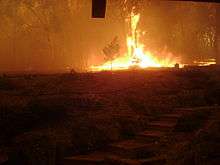
I'd move to Los Angeles if New Zealand and Australia were swallowed up by a tidal wave, if there was a bubonic plague in England and if the continent of Africa disappeared from some Martian attack. ~ Russell Crowe
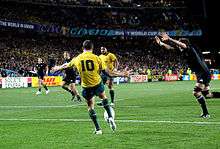
Yeah mate I bloody was like a rat up a drainpipe in one of them runs there. ~ Nick Cummins
- You can take them out of England, but you just can't take the convict out of them.
- Jeremy Clarkson, as quoted in The Daily Mail
- I'd move to Los Angeles if New Zealand and Australia were swallowed up by a tidal wave, if there was a bubonic plague in England and if the continent of Africa disappeared from some Martian attack.
- Russell Crowe, as quoted in New York Daily News (2000)
- God bless America, God Save the Queen, God defend New Zealand and thank Christ for Australia.
- Russell Crowe, as quoted in "Kiwis find something to crow about", The Telegraph (28 March 2001)
- Yeah mate I bloody was like a rat up a drainpipe in one of them runs there.
- Nick Cummins, as quoted in "Translating the world’s most Australian man, Western Force rugby player Nick Cummins", news.com.au, 26 February 2014.
- This country shall remain forever the home of the descendants of those people who came here in peace in order to establish in the South Seas an outpost of the British race.
- John Curtin, as quoted in Fact Sheet 8 (2013)
F
- With its weird red earth and its alien flora and fauna - the eucalyptus trees and kangaroos - Australia was the eighteenth-century equivalent of Mars. This helps explain why the first official response to the discovery of New South Wales by Captain Cook in 1770 was to identify it as the ideal dumping ground for criminals.
- Niall Ferguson, Empire: How Britain Made the Modern World (2003).
- The great paradox of Australian history is that what started out as a colony populated by people whom Britain had thrown out proved to be so loyal to the British Empire for so long. America had begun as a combination of tobacco plantation and Puritan utopia, a creation of economic and religious liberty, and ended up as a rebel republic. Australia started out as a jail, the very negation of liberty. Yet the more reliable colonists turned out to be not the Pilgrims but the prisoners.
- Niall Ferguson, Empire: How Britain Made the Modern World (2003).
- It is of no use to shut our eyes to the fact that there is a great feeling all over Australia against the introduction of coloured persons. It goes without saying that we do not like to talk about it, but it is so.
- No continent is as small and fragmented as Europe. Only Australia is smaller.
G
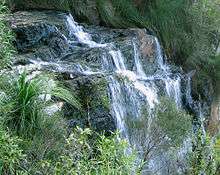
We have this cohort of people in Australia who haven't moved as far as we'd like them to. ~ Mick Gooda
- We have this cohort of people in Australia who haven't moved as far as we'd like them to... The Australian Dream. We sing of it, and we recite it in verse... "Australians all, let us rejoice for we are young and free." My people die young in this country. We die 10 years younger than average Australians and we are far from free... Australians are coming to this with newly opened ears and clear eyes, yet we have been telling this story for so long... One day, I want to stand here and be able to say as proudly and sing as loudly as anyone else in this room, Australians all, let us rejoice... Australia as a nation was formed in 1901. My people have been in Australia 20,000 years... So for us, once we're included in the constitution we will then have reason to celebrate, but not at the moment.
- Stan Grant, as quoted in "The racism speech that made Australians sit up and take notice" (25 January 2016), by Hilary Whiteman, CNN, Fulton County, Georgia: Cable News Network
H
[T]o a great extent, Australia is leading the way. ~ Stephen Hadley
Every day's a good day in Australia. ~ Paul Hogan
- So far, the world economy, particularly Australia and the United States, have benefited greatly from Chinese economic growth. This is likely to continue to be the case for some time... Values and institutions based on freedom, democracy, human rights, and market economics must now compete for adherents on a global basis. This is a big challenge not only for the United States but also for Australia... A way must be found for the United States and China to work together with the rest of the international community to meet the global challenges we face. Success in this effort will require the closest cooperation among the United States, Australia, and our friends and allies in the Asia-Pacific. And to a great extent, Australia is leading the way.
- Stephen Hadley, "America's Role In The World" (30 October 2014), Lowy Institute
- I and most Australians want our immigration policy radically reviewed and that of multiculturalism abolished. I believe we are in danger of being swamped by Asians. Between 1984 and 1995, 40 per cent of all migrants coming into this country were of Asian origin. They have their own culture and religion, form ghettos and do not assimilate.
- Pauline Hanson, "Maiden Speech" (1996).
- In Australia the pressure of the Scots and especially of the Irish forced the abandonment of 'English' as the identity of the colonies in favour of 'British'. The Irish of course could still bridle at a British identity even when it included them as equals. In time, with the passing of the first generation born in Ireland and the growth of a distinctively Australian interpretation of Britishness, they were prepared to accept it.
- John Hirst, Sense and Nonsense in Australian History (2005).
- Multiculturalists encourage vagueness about 'contributions' to give the impression of equal participation, as in the 'new age' school sports where every player in the team must handle the ball before a goal can be scored. If one were to compose a more precise ethnic history it would read something like this: The English, Irish and Scots were the founding population; they and their children established the Australian nation.
- John Hirst, Sense and Nonsense in Australian History (2005).
- The European discovery rather than Aboriginal occupation constitutes Australia's pre-history. Australia - its economy, society and polity - is a construction of European civilisation. Australia did not exist when traditional Aborigines occupied the continent. Aborigines have been participants in Australian history, but that story begins with all the others in 1788... Before the Europeans arrived, there were 500 to 600 tribes in the continent speaking different languages. They did not have a common name or share an identity; they regarded each other as enemies. The Aborigines as we know them today, a national group with a common identity, did not exist before European contact; they are a product of the European invasion which destroyed traditional culture, brought people of different tribes together and gave them a common experience of oppression and marginalisation. They are not an ancient people, but a very modern one. Only in the lands which Europeans did not want or settled very sparsely did traditional groups and something like traditional culture survive.
- John Hirst, Sense and Nonsense in Australian History (2005).
- Australians, like other peoples, tend to think they are highly distinctive, but the characteristics they value may be an extension or an exaggeration of what they brought from the mother country. In some respects they may be more like the peoples of other new lands settled by the British than they are willing to acknowledge. Australian soldiers and Australian nurses of World War I felt themselves to be very different from their English counterparts but the English were inclined to see all the colonials - New Zealanders, Canadians and Australians - as similar and different from themselves.
- John Hirst, The Australians: Insiders and Outsiders on the National Character since 1770 (2007).
- Paul Hogan: America, you look like you need a holiday, a fair dinkum holiday. You'll have to learn to say g'day. 'Cause every day's a good day in Australia.
- Woman: G'day, Paul.
- Paul Hogan: G'day, love. You'll have to get used to the local customs like getting a sun tan in a restaurant, playing football without a helmet, and calling everyone 'mate'. Thanks, mate.
- Barman: She's right, mate.
- Paul Hogan: Apart from that, no worries. You'll have the time of your life in Australia. Come on, come and say g'day. I'll slip an extra shrimp on the barbie for you.
- I'm not in favour of going back to a White Australia policy. I do believe that if it is – in the eyes of some in the community – that it's too great, it would be in our immediate-term interest and supporting of social cohesion if it were slowed down a little, so the capacity of the community to absorb it was greater.
- John Howard, as quoted in The Australian (February 2006)
- The White Australia is yours. You may do with it what you please, but at any rate, the soldiers have achieved the victory and my colleagues and I have brought that great principle back to you from the conference, as safe as it was on the day when it was first adopted.
- Billy Hughes, as quoted in "Rise and Fall of White Australia" (2001), 100 Years: The Australian Story, Australia: National Council for the Centenary of Federation
J
Earth is here so kind, that just tickle her with a hoe and she laughs with a harvest. ~ Douglas William Jerrold
- I love food, all types of food. I love Korean food, Japanese, Italian, French. In Australia, we don’t have a distinctive Australian food, so we have food from everywhere all around the world.
- Hugh Jackman, as quoted in "Hugh Jackman Calls Daughter "White Foods Girl", OK Magazine, 2 June 2011.
- Earth is here so kind, that just tickle her with a hoe and she laughs with a harvest.
- Douglas William Jerrold, as quoted in A Land of Plenty, reported in Bartlett's Familiar Quotations, 10th ed. (1919).
- Australia has its faults, as does any other country. But laughing in our face about it, then mocking our heritage was definitely not called for. It embarrassed and degraded our country as well as making us look like total idiots.
- James Joyce, "Cutting edge — feature" (5 November 2005), The Newcastle Herald, p. 8.
L
- In Australia, if you drive a red or yellow Bentley convertible down the street, everyone thinks "What a wanker!"
- Luc Longley, as quoted in "Luc Longley Pod Special" (8 June 2015), by Roger Bennett, Men in Blazers
M
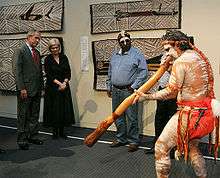
We have a mostly cohesive multicultural society with high rates of successful immigration. ~ Jacqueline Maley
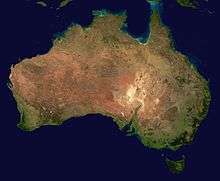
In joyful strains then let us sing, advance Australia fair! ~ Peter McCormic

Do you come from a land down under? Where women glow and men plunder? Can't you hear, can't you hear the thunder? You better run, you better take cover. ~ Men at Work
- These little critters aren’t the type that just land on your bread roll whilst eating out at a restaurant... This means they make a beeline for places such as the inside of your ear, your mouth, nostrils, or eyes... If they land on your leg or hand they’ll happily just stand there for minutes on end rubbing their front legs together like some manic chef sharpening his calving knives before cutting into a big joint of meat.
- Mark of Getting Down Under, "Flies in Australia - Kind of Annoying!"
- As Australians we have been for generations privileged to live in the country.
- Michele Madigan, "Funding Cuts to Remote WA and SA Communities Will Destroy Aboriginal Life" (8 April 2015), Sydney Catholic
- We have a mostly cohesive multicultural society with high rates of successful immigration. This week the maiden speeches of three senators from both sides of politics were full of praise for multiculturalism and the benefits it has brought the country. Unlike Europe, we don't have any mainstream extreme right-wing supremacist political parties and there is a genuine public acceptance of multiculturalism and its place at the heart of the country's modern character.
- Jacqueline Maley, "Why Australia is perceived as racist" (2013), Sydney Morning Herald
- In joyful strains then let us sing, "Advance Australia fair!"
- Advance Australia Fair, lyrics by Peter Dodds McCormick. Australian national anthem (1878)
- Do you come from a land down under?
Where women glow and men plunder?
Can't you hear, can't you hear the thunder?
You better run, you better take cover.- Men at Work, "Down Under", Business as Usual (1981)
- Man in Black: You've made your decision then?
- Vizzini: Not remotely. Because iocane comes from Australia, as everyone knows. And Australia is entirely peopled with criminals. And criminals are used to having people not trust them, as you are not trusted by me. So I can clearly not choose the wine in front of you.
- Man in Black: Truly you have a dizzying intellect.
- Vizzini: Wait 'til I get going... where was I?
- Man in Black: Australia.
- Vizzini: Yes, Australia, and you must have suspected I would have known the powder's origin, so I can clearly not choose the wine in front of me.
- The Princess Bride (1987)
- Australia was a fantastic choice because it has lots of quirky visual things. And it's a country that is really very close to America, very in sync with America. We are so similar but yet there are all these fantastic differences, familiar yet twisted. It was intentional to make it very inaccurate. That was our evil side coming out: We'll take our knowledge of Australia and we'll twist it around to stimulate an audience and annoy them at the same time.
- David Mirkin, as quoted in "Cutting edge — feature" (5 November 2005), by James Joyce, The Newcastle Herald, p. 8
- The pioneers were prepared to suffer hardship in order to get a foothold in the Australia they were in the process of building... Within a half century of settlement, the foundations of a British civilization had been laid down on a continent which was months removed by sea from its cultural origins. The fact that one aspect of this civilization was that of a penal colony did not stop the determined drive of many citizens to shape a free society.
- John Molony, The Penguin Bicentennial History of Australia (1987)
O
- Australia is still a young nation that lacks a true identity. We need to establish ourselves as a unique entity.
- Conor Oates, as quoted in "Should Australia's switch to Dollarydoos? Tens of thousands sign petition to change the Australian currency 'to stimulate the economy'" (17 October 2015), by Cindy Tran, The Daily Mail
R
- Whenever we have the Simpsons visit another country, that country gets furious, including Australia.
- Mike Reiss, "Simpsons' secret is eternal youth" (27 February 2007), The Age
S
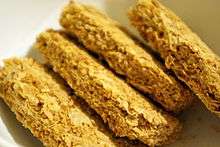
Aussie kids are Weet-Bix kids. ~ Sanitarium

Our community cohesion is currently under strain. This isn't mere speculation. A recent survey of Muslim people in Sydney indicated that 57 percent had experienced racism - a rate about three times higher than the national average... Many communities believe there has been a marked increase in anti-Muslim abuse... ~ Tim Soutphommasane
- Aussie kids are Weet-Bix kids.
- Slogan for Sanitarium's Weet-Bix
- Our community cohesion is currently under strain. This isn't mere speculation. A recent survey of Muslim people in Sydney indicated that 57 percent had experienced racism - a rate about three times higher than the national average. As documented in the Australian Human Rights Commission's Freedom from Discrimination report, published in November, many communities believe there has been a marked increase in anti-Muslim abuse and vilification... The Cronulla riot represented not the best, but the worst of national pride. It was caused by a lapse, from which we are not immune - not then, and not now. Because where there is fear and hate, prejudice and intolerance, something like it could happen again.
- Tim Soutphommasane, "There are echoes of the Cronulla riots on our streets today" (11 December 2015), The Drum, ABC
- I think it's one of those great unresolved topics in Australian society. I'm not sure anyone necessarily has a perfect answer to the problem but a lot of people are concerned about it.
- Ed St. John, as quoted in "The racism speech that made Australians sit up and take notice" (25 January 2016), by Hilary Whiteman, CNN, Georgia: Cable News Network
T

Until recently I thought we'd improved race relations in Australia. The Adam Goodes saga tells us otherwise. If our elite athletes get racially abused, what hope does the average Khaled, Ahmed or Maryam have of a fair go in society? ~ Mohamed Taha
- I was shocked, disgusted, angry and confused as I walked into my school the day after the Cronulla riots. I was 14 years old... The Cronulla riots. One of the ugliest episodes in recent Australian history didn't happen in a vacuum. It was a culmination of a bubbling undercurrent of racial tensions and clashes between young Caucasian and Middle Eastern men... Australia's undercurrent of racism reared its ugly head that day. And despite it being 10 years ago, many are still affected today. The majority of my Year 12 cohort went on to attend university, college and TAFE. Some entered the workforce. Many went through an identity crisis. Some changed their name to make it more "Anglo-friendly" for work purposes. Some internalised racism. Others adopted a victim mentality and blamed the system for everything that went wrong in their life. While others developed an inferiority complex. Sadly, some still carry these demons with them today... Until recently I thought we'd improved race relations in Australia. The Adam Goodes saga tells us otherwise. If our elite athletes get racially abused, what hope does the average Khaled, Ahmed or Maryam have of a fair go in society?
- Mohamed Taha, "Generation Cronulla: How the riots shaped who I am" (11 December 2015), The Drum, ABC.
External links
- Official website



This article is issued from
Wikiquote.
The text is licensed under Creative
Commons - Attribution - Sharealike.
Additional terms may apply for the media files.